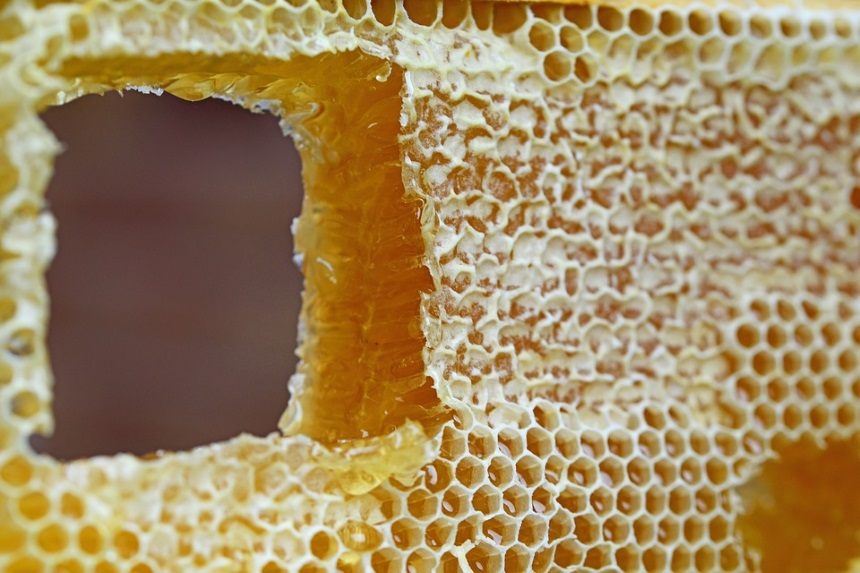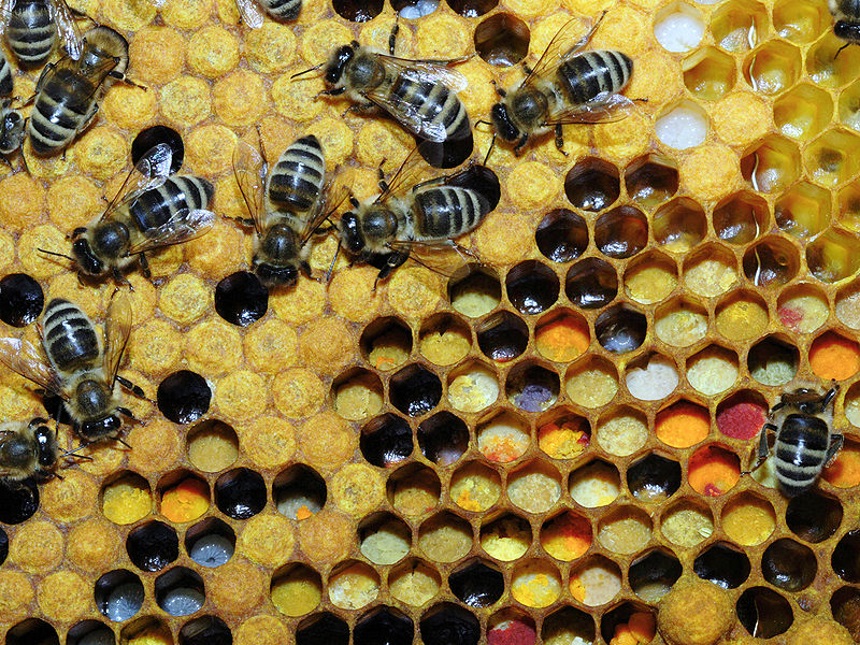Learning the Art of Beekeeping -- Part Six
The following is a small excerpt from my previously published book, The Beekeeper's Guide.
What Does Your Beehive Produce?
What is produced in a honeybee hive? There are several items that get produced by a colony of bees; including, most notably, honey.
Honey is simply a sweet food made by the bees from flower nectar. They collect the nectar and when they return home store it in the honeycomb. The nectar is then transformed into honey by a process of regurgitation and evaporation. For the bees, it is their primary food source. For us humans, it is a delicious food source that is approximately the same sweetness as granulated sugar. Many people use it as a sugar substitute when baking.
The flavor of the honey is highly affected by the source of the nectar. Different trees and flowers produce different flavors of honey. For most hobbyist and even professional beekeepers, their honey will be classified as wildflower honey. The wildflower honey designation means that multiple types of flowers were visited by the bees to collect their nectar. If the bees are in an area where they visit only one type of flower or tree, that honey can be classified as such. For instance, a hive in the middle of an apricot orchard several acres large could possibly be labeled as apricot honey. Some of these specialty honeys are absolutely sublime.
Honey is often used as a sugar substitute. Self-sufficiency is one of the reasons I first started keeping bees. Most estimates for food requirements state around 50-60 pounds of sugar is sufficient for one person for a year. Using an average of 100 pounds of honey per beehive per year, a beehive or two, or even three or four might just be able to produce all the sweetener you and your family need for a year. If you get really excited about beekeeping, excess honey can be sold at local markets since your honey is local and fresh. With even 10 hives you could be producing quite a bit of extra cash every year. Many professional beekeepers have started out just this way. Starting with just one or two hives and slowly growing their collection of hives into a full-time occupation.
Bees also produce wax. This wax is used by the bees to create their beautiful homes. For humans, the wax represents a useful and profitable resource. Beeswax is used in making many cosmetics, candles and many other things. For the bees to produce a pound of wax they must consume about 24 pounds of honey. To accomplish this feat, they must fly a collective 150,000 miles to gather the food energy to make the pound of wax. So your wax is precious. Some beekeepers take as much wax as they can every year during harvest. Others prefer their honey bees to produce more honey and less wax. They try and take as little wax as possible during harvest time. The wax you collect will mostly be in the form of cappings. These are the tiny caps the bees use to seal the honey in the honeycomb. If your harvest produces about 100 pounds of honey, you may have approximately 2 pounds of wax from cappings. The more you take during harvest, the more your bees will need to produce the following year.
Pollen is collected by worker bees as they fly from flower to flower. Once the bees collect the pollen, they mix it with a bit of honey and then store it in the honeycomb for when it is needed as food for the larvae. Sometimes this pollen and honey mixture is called bee bread. Bee pollen contains all 22 of the elements that compose the human system. Because of this, it has been used as a food for thousands of years. Almost every culture has hailed bee pollen as a therapeutic remedy. It contains almost all of the B complex vitamins as well as several minerals and trace elements. Composed of 55% carbohydrates, 35% protein, 3% vitamin and minerals and 2% fatty acids, the pollen is much sought after as a health food. Some people even claim that small amounts of pollen eaten daily help inoculate them against the worst effects of seasonal allergies. It has no known side effects.
Propolis is another wonderful product we get from our bees. A resinous mixture that bees collect from plants and flowers, propolis is used to reinforce the beehive, seal alternate entrances to make the hive more defensible, and to inhibit fungal and bacterial growth within the hive. It is also used by the bees to inhibit vibrations in the hive.
Although the thought of propolis as a health substance has proponents as well as opponents, modern science has shown it to have antimicrobial properties that seem to help with a wide variety of ailments including cold sores and mouth pain. It is also widely used as an oral hygiene product that helps protect against cavities and other oral disease. It is also touted as useful in fighting stomach and intestinal disorders as well as some wounds and burns. Some studies have even shown a possible use in the fight against cancer.
Propolis is quite sticky when the temperature is above 68 degrees Fahrenheit. Below that temperature it becomes hard and brittle. You will quickly see this when you open your hive in the cooler temperatures. Sometimes, after the bees have sealed the boxes together with propolis, you will hear a loud crack when you break the propolis seal.
My book, The Beekeeper's Guide, is available for purchase on Amazon right here.
© 2015, Stone Golem Publishing, All rights reserved--no part of this may be used without express written consent.
**The pictures are all from Wikipedia or Pixabay and labeled for reuse with no stipulations.
Follow @bigpanda for more flash fiction and homesteading tips.





Yikes! Great information about the classifications of bees. For me, honey with lemon is the best natural remedy for sore throat. Also, I still drink honey and I really love it. Thanks @bigpanda:)
My wife drinks honey lemon tea every morning made with honey from our bees. It is incredible how effective it is on a sore throat. I drink it, but only when I feel a sore throat coming on.
Thats good. Honeys are truly amazing. Send me some honeys bigpanda:).
I make an infusion of ginger with a clove of garlic in it if I have a really bad cold. I use quite a bit of ginger so it's highly concentrated. I mix the infusion half and half with boiling water and add honey and lemon. That drink was better for my chest cold than most medications. The only thing I found is that it doesn't last long. I had to drink a cup every two or three hours to keep the cold at bay. You can leave out the garlic if the taste turns you off too much. I think it's a little less effective without it but tastes better and is better than nothing.
Interesting (and fun) fact I never knew before reading this post...
I always assumed honey was honey, but I can see how what the bees pollinate and bring back to the hive can determine the flavor; just as when we go hunting for deer, we prefer corn fed deer as they have more tender meat/venison and tastes less gamey. Makes sense to me now about the bees and their honey
It is incredible what variety there is in honey flavors. To be officially classified as a specific type of honey, for instance as "orange honey" the beehive must be placed such that the bees will collect the vast majority of their nectar and pollen from the specific flowers. If the bees can access different types of flowers then it is just considered either wild honey or honey.
That is so cool!
Next time I go to the local bee farm/store to buy raw honey for my soapmaking, I am going to really read the labels now.
Hi,@bigpanda try to mix honey with clarified butter. Then tell me the taste.
I think you will enjoy this too much. Try this honey-clarified butter with Bread.
I love that! My grandmother used to make this mix when I was young and then we ate it on toast. It is one of my fondest memories of her--she and I sitting in the kitchen eating honey-butter toast.
WOW, Great @bigpanda. You already ate this with your grandmother. This is your sweetest memory.So Lovely. Every grandmother is sweet for his grandchildren. God bless her!
you say good
The more I read the more it blows my mind. I've used beeswax polish in the past and it was a premium product, now I see why.
Thanks again for another lesson in nature.
It is crazy how little beeswax the bees produce. I always try and save the little I get from collection and "feed" it back to them. They chew it up and reuse it--this allows my bees to produce more honey and not waste the energy on producing the needed beeswax.
Another great post! With this explanation we will be an expert in beekeeping!!
Thanks @crissimoes.
Honey, wax, bees are amazing, keep up the great posts @bigpanda .
Thanks @tony67. They are definitely amazing.
Dear @bigpanda
I mentioned you in my last article about "TOP 5 trending Nature accounts you should follow today" for creating the best content out there about Nature! Guess who is the winner ;)
Feel free to read about yourself:
https://steemit.com/nature/@bestmemes/top-5-trending-nature-accounts-you-should-follow-today
Thanks! I appreciate the shout out.
Thank you very much for your Upvote!
I appreciate a lot, I would be happy for a short feedback (:
My, really? Talking about interesting facts! I am really digging all this... thank you for sharing!
Am already thinking do something with bees
Even if I don't like them
Have learnt alot
I'm glad you are thinking of keeping bees. If you do, let me know how it goes.
What is honey healthy or good kind Is wild honey bees eat on many types of trees and flowers or honey, which feeds on one type in a field, such as Apricot?
If it was possible video of how to extract honey from the cell Are there substances used to remove honey from the cell or just be squeezed and cell
I will definitely shoot a video this fall when I extract the honey. It is several months away though.